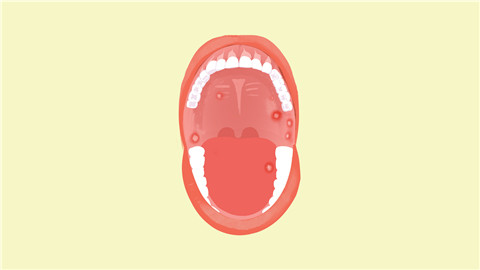What should I do if I have a mouth ulcer?
Generally, mouth ulcers may be caused by long-term consumption of spicy and hot foods, prolonged mental stress, deficiency of vitamin B complex, recurrent aphthous ulcers, oral candidiasis, and other factors. It is recommended to seek medical attention promptly, identify the underlying cause, and improve the condition under a doctor's guidance through general management, medication, and other treatments. Specific analyses are as follows:

1. Long-term consumption of spicy and hot foods: Frequently eating spicy and hot foods such as chili peppers, hot pot, or spicy hot pot can irritate the oral mucosa, leading to mucosal damage and ulcer formation, often accompanied by significant pain. Adjust the diet immediately by choosing cool or lukewarm, mild liquid or semi-liquid foods such as millet porridge, vegetable soup, or cold milk.
2. Prolonged mental stress: Long-term anxiety and tension can lead to endocrine disorders and decreased immunity, making the oral mucosa more susceptible to external factors and resulting in mouth ulcers that heal slowly. Maintain regular sleep patterns, avoid staying up late, and ensure 7–8 hours of sleep daily. Reduce stress through exercise, listening to music, meditation, and similar methods.
3. Vitamin B complex deficiency: A chronic deficiency of vitamins such as B2 and B12 can impair the repair capacity of the oral mucosa, leading to frequent ulcers with slow healing, possibly accompanied by symptoms like angular cheilitis or glossitis. Patients should take vitamin B2 tablets, compound vitamin B tablets, vitamin B12 tablets, or other supplements as directed by a physician to correct the deficiency.
4. Recurrent aphthous ulcers: This condition is triggered by immune dysfunction, genetic factors, and others, causing frequent recurrence of mouth ulcers. The lesions are typically round or oval with noticeable pain. They usually heal spontaneously within 1–2 weeks but tend to recur. Patients should use medications such as watermelon frost spray, Kangfuxin solution, or compound chlorhexidine mouthwash as prescribed to relieve pain and promote healing.
5. Oral candidiasis: Overgrowth of Candida in the mouth leads to infection, causing persistent non-healing ulcers covered with white pseudomembranes. After removing the membrane, a reddened, inflamed base is visible, often accompanied by dry mouth and burning pain. Patients should take antifungal medications such as nystatin tablets, fluconazole capsules, or itraconazole capsules as directed by a physician to suppress Candida growth.
Maintain good oral hygiene in daily life: brush teeth twice daily with a soft-bristled toothbrush, rinse the mouth with warm salt water or a gentle mouthwash after meals, and avoid biting hard objects to prevent accidental injury to the oral mucosa. Through comprehensive lifestyle adjustments and proper treatment, the frequency of ulcer outbreaks can be reduced, wound healing promoted, and overall oral health maintained.






